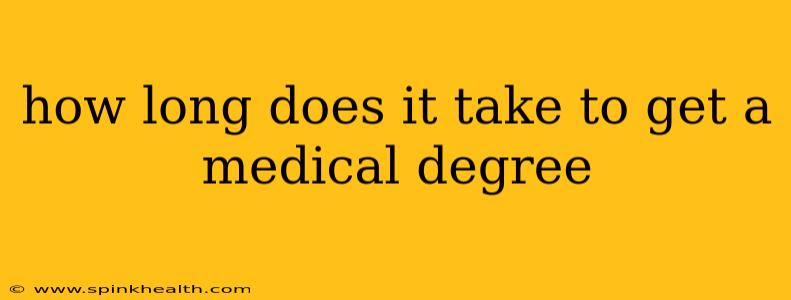The Long and Winding Road: How Long Does It Take to Become a Doctor?
The journey to becoming a medical doctor is a marathon, not a sprint. It's a demanding path filled with rigorous study, intense practical experience, and unwavering dedication. But how long does this transformative journey actually take? The answer, unfortunately, isn't a simple number. It varies depending on several factors, and understanding these nuances is crucial.
Let's embark on a storytelling journey to explore the timeline, highlighting the key stages and potential variations.
Imagine young Sarah, bright-eyed and full of ambition, dreaming of becoming a cardiothoracic surgeon. Her journey begins with the prerequisite steps:
Phase 1: The Undergraduate Years (4 years)
Sarah, like most aspiring physicians, first needs a strong foundation in science. This typically involves a four-year undergraduate degree, focusing on biology, chemistry, physics, and often mathematics. She chooses a Bachelor of Science degree, but it’s worth noting that some students opt for other degrees, as long as they complete the necessary pre-med requirements. This period isn't just about grades; it's about gaining experience through volunteering, research, and shadowing to strengthen her medical school application.
Phase 2: Medical School (4 years)
After acing the MCAT and navigating the highly competitive application process, Sarah secures a place in medical school. These four years are intense, demanding a deep dive into the intricacies of human anatomy, physiology, pathology, pharmacology, and much more. She'll spend countless hours studying, attending lectures, participating in labs, and honing her clinical skills through simulated patient interactions. The curriculum is rigorous, and the pressure is immense, but Sarah perseveres, driven by her passion.
Phase 3: Residency (3-7+ years)
Graduation from medical school is just the beginning! Sarah now embarks on her residency, a period of postgraduate training where she gains hands-on experience under the supervision of experienced physicians. The length of residency varies dramatically depending on her chosen specialty. A general practitioner might complete a 3-year residency, while a neurosurgeon could be looking at 7 years or even longer. This is where she applies her knowledge from medical school in a real-world setting, treating patients and learning the nuances of her chosen field.
Phase 4: Fellowship (Optional, 1-3+ years)
For many specialists, particularly those in highly competitive fields like cardiology or neurosurgery (Sarah's chosen field!), a fellowship follows residency. This is an advanced training period that allows for further specialization and expertise within a specific sub-specialty. This adds another 1-3+ years to the overall timeline.
So, how long is it really?
Adding it all up, the minimum time commitment to become a physician is generally considered to be 11 years (4 years undergraduate + 4 years medical school + 3 years residency). However, for many specialists, it could easily extend to 14 years or even longer, particularly if a fellowship is involved.
How Long Does It Take to Become a Specific Type of Doctor?
This is a frequently asked question and the answer varies greatly. It's heavily dependent on the chosen specialty. Some specialties, like family medicine, have shorter residency programs, while others, like surgical specialties, have significantly longer ones.
What Are the Steps to Becoming a Doctor?
The steps are consistent across the board: undergraduate education meeting pre-med requirements, successful completion of the MCAT, acceptance into medical school, completion of medical school, securing a residency position in a chosen specialty, and then potentially a fellowship.
How Much Does It Cost to Become a Doctor?
This is another critical factor often overlooked. The cost of medical education is substantial, encompassing tuition fees, living expenses, and other associated costs. The total cost can easily reach hundreds of thousands of dollars.
Is It Worth It to Become a Doctor?
The decision to pursue a medical career is a deeply personal one. While it's a long and demanding journey, the potential rewards – both professionally and personally – are significant for those dedicated enough to see it through. The impact on patients' lives, the intellectual stimulation, and the sense of purpose are powerful motivators for many aspiring physicians.
Sarah's journey, while fictional, represents the reality for many aspiring physicians. It's a long road, filled with challenges and triumphs, but for those with the passion and perseverance, the destination is incredibly rewarding.

